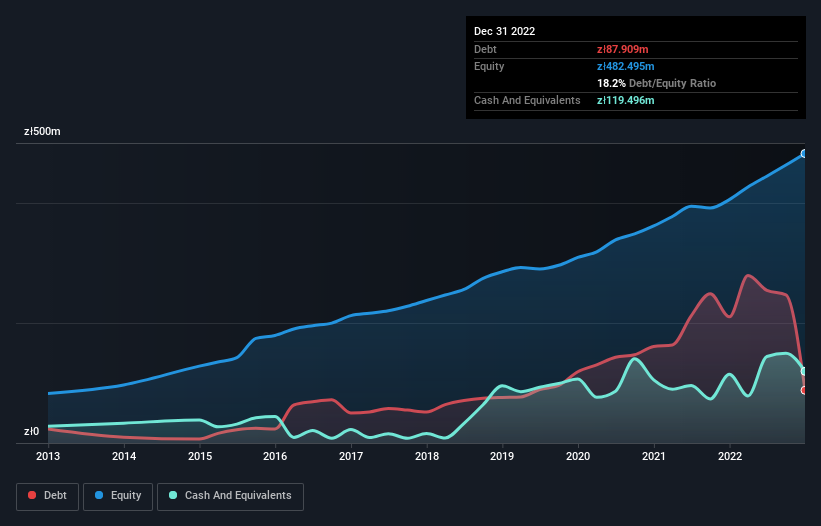- Poland
- /
- Construction
- /
- WSE:PBX
These 4 Measures Indicate That Pekabex (WSE:PBX) Is Using Debt Reasonably Well
Legendary fund manager Li Lu (who Charlie Munger backed) once said, 'The biggest investment risk is not the volatility of prices, but whether you will suffer a permanent loss of capital.' When we think about how risky a company is, we always like to look at its use of debt, since debt overload can lead to ruin. We can see that Pekabex S.A. (WSE:PBX) does use debt in its business. But the more important question is: how much risk is that debt creating?
What Risk Does Debt Bring?
Generally speaking, debt only becomes a real problem when a company can't easily pay it off, either by raising capital or with its own cash flow. Ultimately, if the company can't fulfill its legal obligations to repay debt, shareholders could walk away with nothing. However, a more common (but still painful) scenario is that it has to raise new equity capital at a low price, thus permanently diluting shareholders. Of course, the upside of debt is that it often represents cheap capital, especially when it replaces dilution in a company with the ability to reinvest at high rates of return. The first thing to do when considering how much debt a business uses is to look at its cash and debt together.
See our latest analysis for Pekabex
What Is Pekabex's Net Debt?
The image below, which you can click on for greater detail, shows that Pekabex had debt of zł87.9m at the end of December 2022, a reduction from zł210.3m over a year. However, it does have zł119.5m in cash offsetting this, leading to net cash of zł31.6m.

A Look At Pekabex's Liabilities
According to the last reported balance sheet, Pekabex had liabilities of zł641.8m due within 12 months, and liabilities of zł200.6m due beyond 12 months. Offsetting this, it had zł119.5m in cash and zł479.8m in receivables that were due within 12 months. So it has liabilities totalling zł243.2m more than its cash and near-term receivables, combined.
Pekabex has a market capitalization of zł487.8m, so it could very likely raise cash to ameliorate its balance sheet, if the need arose. But it's clear that we should definitely closely examine whether it can manage its debt without dilution. While it does have liabilities worth noting, Pekabex also has more cash than debt, so we're pretty confident it can manage its debt safely.
On top of that, Pekabex grew its EBIT by 82% over the last twelve months, and that growth will make it easier to handle its debt. There's no doubt that we learn most about debt from the balance sheet. But it is future earnings, more than anything, that will determine Pekabex's ability to maintain a healthy balance sheet going forward. So if you want to see what the professionals think, you might find this free report on analyst profit forecasts to be interesting.
But our final consideration is also important, because a company cannot pay debt with paper profits; it needs cold hard cash. While Pekabex has net cash on its balance sheet, it's still worth taking a look at its ability to convert earnings before interest and tax (EBIT) to free cash flow, to help us understand how quickly it is building (or eroding) that cash balance. During the last three years, Pekabex generated free cash flow amounting to a very robust 98% of its EBIT, more than we'd expect. That positions it well to pay down debt if desirable to do so.
Summing Up
While Pekabex does have more liabilities than liquid assets, it also has net cash of zł31.6m. The cherry on top was that in converted 98% of that EBIT to free cash flow, bringing in zł127m. So is Pekabex's debt a risk? It doesn't seem so to us. Over time, share prices tend to follow earnings per share, so if you're interested in Pekabex, you may well want to click here to check an interactive graph of its earnings per share history.
When all is said and done, sometimes its easier to focus on companies that don't even need debt. Readers can access a list of growth stocks with zero net debt 100% free, right now.
New: Manage All Your Stock Portfolios in One Place
We've created the ultimate portfolio companion for stock investors, and it's free.
• Connect an unlimited number of Portfolios and see your total in one currency
• Be alerted to new Warning Signs or Risks via email or mobile
• Track the Fair Value of your stocks
Have feedback on this article? Concerned about the content? Get in touch with us directly. Alternatively, email editorial-team (at) simplywallst.com.
This article by Simply Wall St is general in nature. We provide commentary based on historical data and analyst forecasts only using an unbiased methodology and our articles are not intended to be financial advice. It does not constitute a recommendation to buy or sell any stock, and does not take account of your objectives, or your financial situation. We aim to bring you long-term focused analysis driven by fundamental data. Note that our analysis may not factor in the latest price-sensitive company announcements or qualitative material. Simply Wall St has no position in any stocks mentioned.
About WSE:PBX
Pekabex
A construction company, engages in the production and sale of prefabricated reinforced and pre-stressed concrete elements in Poland, Sweden, Denmark, Germany, Switzerland, Hungary, and internationally.
Adequate balance sheet and slightly overvalued.
Market Insights
Community Narratives



